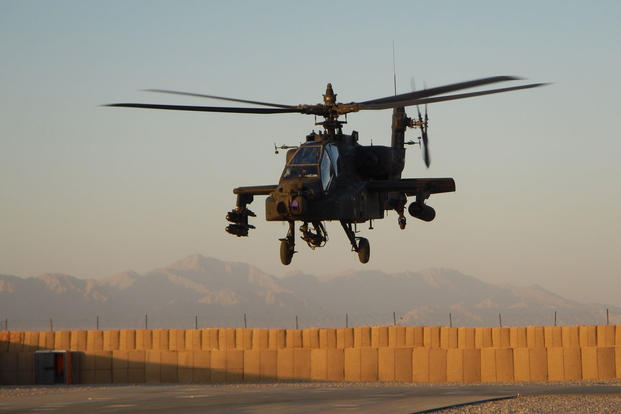AH-64 Apache helicopter gunships are flying night combat missions in support of the offensive to take the last major stronghold of the Islamic State in Iraq, a U.S. general said Wednesday.
"They've been flying at night, supporting any nighttime operations that the Iraqis are doing" since the Mosul offensive started Monday, Army Maj. Gen. Gary Volesky said of the Apaches in a video briefing from Baghdad to the Pentagon.
"That platform has a lot of capability to see a long range at night and use its weapons system in a standoff capacity to strike targets, and that's what they're doing," said Volesky, commander of Combined Joint Forces Land Component Command-Operation Inherent Resolve and the 101st Airborne Division (Air Assault).
The Boeing Apaches, armed with a 30mm chain gun and four hardpoints for Hellfire missiles, are the latest U.S. contribution to the offensive, including airstrikes, intelligence, HIMARS rocket artillery systems, .155mm artillery and more than 100 U.S. advisers and Joint Terminal Attack Controllers, or JTACs, moving forward with advancing columns to guide coalition warplanes.
Volesky said he wanted to clear up a "misconception" that the JTACs were on the front line with friendly forces calling in airstrikes. "They're primarily at the brigade level, but they're not forward at the front line of the troops -- tip of the spear," he said.
Army Lt. Gen. Stephen Townsend, commander of Combined Joint Task Force-Operation Inherent Resolve, has authority to place JTACs and advisers, mostly Special Forces, at the battalion level with the Iraqi Security Forces and Kurdish Peshmerga, but he has yet to exercise that authority, Volesky said.
Iraqis Dictate the Pace
The pace and planning of the Mosul offensive is being dictated by the Iraqis and could take months to secure the city. It was the country's second largest city with an estimated two million residents before the takeover by the Islamic State of Iraq and Syria in June 2014, said Army Gen. Joseph Votel, commander of U.S. Central Command.
Votel said at the Center for American Progress think tank on Wednesday that ISIS is an "adaptive enemy capable of adjusting to setbacks. I'll give you an example. The operation we did to Manbij in northern Syria took about 71 days to complete, from start to finish."
He also noted the importance of the "'simultaneous application of pressure" in the effort to defeat ISIS, suggesting that U.S.-backed local forces could begin moving toward Raqqa, the self-proclaimed ISIS capital in northeastern Syria, at the same time as the Iraqis move on Mosul.
"I think it's extraordinarily important, and we are certainly attempting to do that," Votel said. "I think what we've seen is, when we apply pressure on the Islamic State forces, they do squirt out. They try to go to other locations, they move leaders, they move the bulk of their forces, they try to relocate some of their operations."
Volesky made a similar point in his briefing to the Pentagon. "We've seen movement out of Mosul" by ISIS fighters, he said.
"A lot of leaders have left. All I can tell you is there are fewer Daesh fighters than there were yesterday and there will be fewer tomorrow," he added, using an Arabic acronym for ISIS.
"They die pretty quickly" when they choose to make a stand, Volesky said of the ISIS fighters, but he acknowledged that they have used mortars, automatic weapons fire and Vehicle-Borne Improvised Explosive Devices to blunt the advance of Kurdish and Iraqi forces as they move through mostly abandoned desert villages to the outskirts of Mosul.
Drones and Tunnel Systems
ISIS also has been using small off-the-shelf drones to conduct surveillance of the advancing forces, Volesky said. "They are using them and we've seen them."
The U.S. is taking countermeasures against the drones, he said, but declined to give details.
Reports from the field also suggested that ISIS fighters are making use of extensive tunnel systems to avoid airstrikes and then pop up on the flanks and to the rear of attacking forces.
An ISIS fighter came out of a tunnel near the village of Abbas, southeast of Mosul, and used a rocket-propelled grenade to destroy an Iraqi army tank, the Kurdish Rudaw news agency reported.
A BBC report and video showed an Iraqi general in a Humvee frantically ordering a U-turn on the approach to a village south of Mosul. The Humvee ran into a ditch, and the general scrambled for cover against ISIS automatic weapons fire.
Signs of Friction
Volesky said the Mosul offensive is the first time he has seen the Kurdish and Iraqi forces coordinate and cooperate on a common objective, but there were signs of friction on the third day of the advance.
Masoud Barzani, president of the Kurdish Regional Government, said that the Iraqis had left the Kurds out of the political planning process for the occupation of Mosul once the city is secured.
"We would have loved to have a political plan along with a military plan -- how to manage Mosul, how to administer Mosul -- because Mosul has a variety of religions, with ethnicities," Barzani told CNN, but he conceded that political planning would have delayed the offensive.
The Kurds are also concerned by the presence outside the village of Bashiqa, northeast of Mosul, of a Turkish military contingent, which has been training tribal fighters for a possible role in Mosul.
Iraqi Prime Minister Haider al-Abadi has repeatedly called for the removal of the Turkish military presence in Iraq, but Turkish President Recep Tayyip Erdogan has rejected Abadi's demands.
Turkish warplanes are ready to join the U.S. and coalition airstrikes on Mosul, but the U.S. has yet to give clearance, Turkey's Anadolu news agency reported.
Volesky made clear that the U.S. does not expect the Iranian-backed Shia Popular Mobilization Units, which are supporting the Iraqi Security Forces, to have any part in the occupation of Mosul.
"We don't support them," Volesky said, and the government of Abadi has been "very upfront about it -- Abadi said there won't be any Shia PMU in Mosul." He said the PMUs are "made up of multiple groups, some of them recognized terrorist operations."
Volesky said the offensive thus far is "on track" to meet its initial objectives, but The Wall Street Journal reported that Iraqi forces south of Mosul had been ordered to halt the advance for 48 hours to consolidate gains and coordinate the next steps.
"I'm not telling the Iraqis to rush to Mosul," Volesky said, adding it is understandable that they would not want to "go so fast that they give combat opportunity to the enemy."
-- Richard Sisk can be reached at Richard.Sisk@Military.com.
Related Video:




























